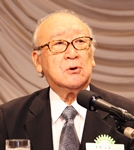To Live by En
September 25, 2013
Mr. Masayasu Yasuoka
Director, Public Interest Incorporated Foundation,
Yasuoka Masahiro Memorial Museum
 ��My father, Masahiro Yasuoka was a thinker of the pre- and postwar times who had exerted considerable influence on the business and political arenas. Ever since my childhood, he encouraged me to ��cherish each En (emotional ties) with others.�� Humans build our first En with parents when we come into the world, then build numerous En with people we encounter throughout our life.
��My father, Masahiro Yasuoka was a thinker of the pre- and postwar times who had exerted considerable influence on the business and political arenas. Ever since my childhood, he encouraged me to ��cherish each En (emotional ties) with others.�� Humans build our first En with parents when we come into the world, then build numerous En with people we encounter throughout our life.
��Having read extensively on En, I found the phrases by Prince Shotoku capture the essence of En most precisely. Prince Shotoku (574-622) was a prominent politician of the Asuka period in Japan. He made remarkable achievements that include his major contributions to the advent of Japanese Buddhism and introducing the first system to rank officials into twelve levels. His biggest achievement is known to be the promulgation of the Seventeen-Article Constitution. Its first article reads ��Harmony should be valued above anything else.�� The last article clarifies ��Decisions on important matters should be made in consultation with others.�� I think these teachings remain valid at the present time.
��Let me share with you what Prince Shotoku taught about En. He believed that all the relationships we build in our lifetime are no coincidence and they are predestined. We might think that we live in the same country, same region, same prefecture or same village by chance. Or we share water, a car, a lodging and a drink by chance. Our relationships vary in depth and intimacy, yet they are preordained by destiny. We must strive to make good relationships, not evil ones.
��I recall my father kept telling me and my three siblings to treasure En at all times. My father was a scholar of the Chinese classics in some way, but he didn��t care about business or academic titles. He taught us to live in honesty and goodness. We went our separate ways in life. My elder brother joined the Finance Ministry, my sisters married academic scholars and I joined a private company. My father was such a gentle person at home, and we never saw his angry face. I came to understand now that he tried not to impose something on his children but tried to respect our self-initiative fostered through many En we were encouraged to treasure.
��Let me share with you another teaching from the Buddhist scriptures: Good relationships lead us to amazing and curious encounters. If we foster good relationships, we will be blessed with meeting good people and good books that enrich our life.
��If I may make a small digression, it has become part of the accepted truth that my father had conceived the name of the current era Heisei, although the government has never made an official announcement. My siblings and myself were once flooded with interviews and questions by journalists trying to identify its author.
��Unfortunately my father had passed away by then, so to be honest, we didn��t have a clue. Years passed and I had a chance to attend a party where politicians gathered. There, I was approached by the then Prime Minister Takeshita and he whispered ��Heisei was conceived by your father.��
��We come to appreciate the importance of our ancestral background and numerous En built through our long family history. If I may trace my family line, my paternal grandfather was born in 1853, the year when the black ships of Commodore Perry came to Uraga as described in the historical drama series on NHK TV ��Yae no Sakura.�� My maternal grandfather was born in 1876, amidst the drastic changes Japan was undergoing, both domestically and internationally. Five generations in the Yasuoka Family, from my grandfathers to my grandchildren born in the Heisei era, have lived through five different eras of Edo, Meiji, Taisho, Showa and Heisei. I am sure your family history also reveals how your ancestors lived through the turbulent times and the family ties passed down for generations to date.
��I believe by understanding and sharing how our forefathers survived the challenging times will teach us important lessons. Our generation is responsible for handing down this precious asset to our children and grandchildren. We must learn the true and non-biased history of Japan through our family history. As the world becomes more internationalized, we must broaden our views as global citizens. Yet, I hope the younger generations will also cherish the Japanese spirit. Being a parent, we must raise our children to play an active role in the world, based on the genuine understanding of our history.
��Before closing, I have to say my speech today became something like my family story, with some digressions. I hope you will be blessed with many good En in your life in the future. I am sure being a Rotarian fosters good En that will further deepen emotional ties for the years to come.